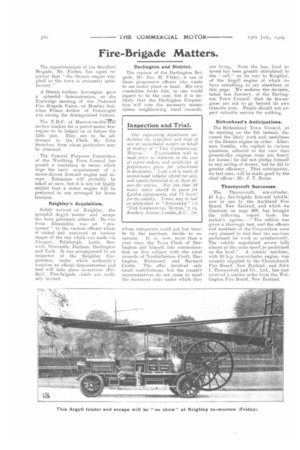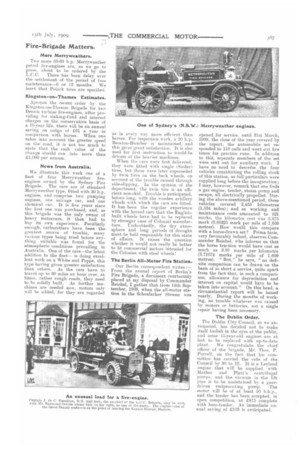Fire-Brigade Matters.
Page 4

Page 5

If you've noticed an error in this article please click here to report it so we can fix it.
The superintendent of the Bradford Brigade, Mr. Forbes, has again reported that " the Dennis engine supplied to the town is eminently satisfactory."
A Dennis turbine fire-engine gave a. splendid demonstration, at the Tonbridge meeting of the National Fire Brigade Union, on Monday last, when Prince Arthur of Connaught was among the distinguished visitors.
The U.D.C. of Harrow-on-the7frill invites tenders for a petrol motor fireengine to be lodged on or before the 24th inst. They are to be addressed to the Clerk, Mr. John Strachan, from whom particulars may be obtained.
The General Purposes Committee of the Worthing Town Council has passed a resolution in terms which urge the early acquirement of a motor-driven first-aid engine and escape. Estimates will probably be asked at once, but it is not yet finally settled that a motor engine will be preferred to one arranged for horse traction.
Keighley's Acquisition.
Safely arrived at Neighley, the splendid Argyll tender and escape has been genuinely admired. Its run from Alexandria was an " eyeopener " to the various officers whom it visited and conveyed at various stages of the run which was made via Glasgow, Edinburgh, Leith, Berwick, Newcastle, Durham. Darlington and York. It was accompanied by an inspector of the Keighley Corporation, under which authority's auspices an official demonstration and test will take place to-morrow (Friday). Fire-brigade chiefs are cordially invited.
Darlington and District.
The captain of the Darlington Brigade, Mr. Jim. H. Uttley, is one of those progressive officers who wants to see motor plant in hand. His own committee backs him, as one would expect to be the case, but it is unlikely that the Darlington Corporation will vote the necessary money unless neighbouring rural councils, whose ratepayers could not but benefit by the purchase, decide to co operate. It is, 110W, more than a year since the Town Clerk of Darlington put himself into communication on this subject with the rural councils of NorthaIlerton, Croft, Darlington, Pihmond, and Barnard Castle. The offer involved only small contributions, but the country representatives do not seem to mind the enormous risks under which they are living. None the less, local interest has been greatly stimulated by the call," on its way to Keighley, of the Argyll engine of which we have something to say elsewhere on this page. We endorse the decision, taken last January, of the Darlington Town Council, that its fire-engines are not to go beyond its own rateable area. People should not expect valuable service for nothing.
Birkenhead's Anticipations.
The Birkenhead Town Council, at its meeting on the 9th instant, discussed the likely work and usefulness of the Dennis engine on order. Alderman Gamlin, who replied to various questions, adhered to the view that present-day engines were too heavy for horses; he did not pledge himself to any saving of money, but he did to greater efficiency. That anticipation, we feel sure, will be made good by the chief officer--Mr. J. T. Burns.
Thornycroft Successes.
The Thornycroft, 6ix-cylinder, 45 h.p., fire-brigade first-aid vehicle, now in use by the Auckland Fire Board, New Zealand, and which we illustrate on page 388, has brought the following report from the maker's agents :—" The vehicle was given a thorough test, and the officers and members of the Corporition were very pleased to find that the machine performed its work so satisfactorily. The vehicle negotiated severe hills almost at the same speed as performed on the level." A similar machine, with 30 h.p. four-cylinder engine, was recently supplied to this Christchurch Fire Board, New Zealand, and John I. Thornycroft and Co., Ltd., has just received a similar order from the Wellington Fire Board, New Zealand.
More Merryweathers.
Two more 50-60 h.p. Merryweather petrol fire-engines are, as we go to press, about to be ordered by the L.C.C. There has been delay over the settlement of the period of free maintenance-6 or 12 months. We learn that Polack tires are specified.
_Kingston -on-Thames Estimates.
Apropos the recent order by the Kingston-on-Thames Brigade for two Denais turbine fire-engines, after providing for sinking-fund and interest charges on the conservative basis of a 10-year life, there will be an annual saving on outgo of 1:61 a year in comparison with horses. When one takes into account the greater speed on the road, it is not too much to state that the cash value of the change should run into more than £1,000 per annum.
News from Australia.
We illustrate this week one of a fleet of four Merryweather fireengines owned by the Sydney Fire Brigade. The ears are of standard Merryweather type, fitted with 30 h.p. engines, and comprise two pumping engines, one salvage car, and one chemical car. It is five years since the first one was purchased, and, as this brigade was the only owner of heavy motorcars, it then had to buy its own experience. Peculiarly enough, carburetters have been the greatest source of trouble, many various types being tried before anything suitable was found for the atmospheric conditions prevailing in Australia. One of the cars—the latest addition to the fleet— is doing excellent work on a White and Poppe, this type having given greater satisfaction than others. As the cars have to travel up to 30 miles an hour over, at times, rather rough roads, they need to be solidly built. As further machines are needed now, motors only will be added, for they are regarded
as in every way more efficient than horses. For inspection work, a 20 h.p. Beeston-Humber is maintained, and this gives great satisfaction. It is also used for first instruction to would-be drivers of the heavier machines.
When the ears were first delivered, they were fitted with single (Sirdar) tires, but these were later superseded by twin tires on the back wheels, on account of the trouble caused through side-slipping. In the opinion of the department, the twin tire is an efficient non-skid. Trouble is anticipated, before long, with the wooden artillery wheels with which the cars are fitted. It has been the regular experience with the horsed cars that the Englishbuilt wheels have had to be replaced by stronger ones of Colonial manufacture. Undoubtedly, the dry atmosphere and long periods of drought must be held responsible for this state of affairs. It raises the question whether it would not really be better to fit commercial motors intended for the Colonies with steel wheels!
The Berlin All-Motor Fire Station.
Our Berlin correspondent writes:— From the annual report of Berlin's Fire Brigade, a document courteously placed at my disposal by Commander Reichel, I gather that from 14th September, 1908, when the all-motor station in the Schonlarker Strasse was opened for service, until 31st March, 1909, the close of the Year covered by the report, the automobile set responded to 110 calls and went out five times for practice runs. In addition to this, separate members of the set were sent out for auxiliary work. I have no need to describe the four vehicles constituting the rolling stock of this station, as full particulars were supplied long before the inauguration; I may, however, remark that one finds a gas engine, tender, steam pump and escape, all electrically propelled. During the above-mentioned period, these vehicles covered 2,455 kilometres (1,534 miles); and as working and maintenance costs amounted to 921 marks, the kilometre cost was 0.375 mark (0.60325 mark per mile of 1,609 metres). How would this compare with a horse-drawn set P Prima facie, very favourably indeed, observes Commander Reichel, who informs us that the horse traction would have cost as much as 3.86 marks per kilometre (5.71074 marks per mile of 1,609 metres). " But," he says, " no definite comparison can be drawn on the basis of so short a service, quite apart from the fact that., in such a comparison, allowance for depreciation and interest on capital would have to be taken into account." On this head, a circumstantial report will be issued yearly. During the months of working, no trouble whatever was caused by motors or batteries, not a single repair having been necessary.
The Dublin Order.
The Dublin City Council, as we anticipated, has decided not to make itself foolish in the eyes of the public, and some 45-year-old engines are at last to be replaced with up-to-date plant. We congratulate the chief officer of the brigade, Mr. Thos. P. Purcell, on the fact that Isis committee has carried the vote of the Council by 30 to 12. It is a Leyland engine that will be supplied, with Mather and Platt's centrifugal pumps, and the vacuum in the lift pipe is to be maintained by a geardriven reciprocating pump. The motor will be of at least 50 b.h.p., and the tender has been accepted, in open competition, at ,875 complete with hose-tender. An immediate annual saving of 153 is anticipated.




















